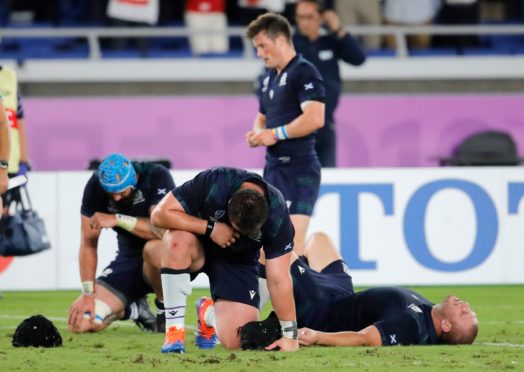Happy New Year, and Happy New Decade also, illustrated everywhere it seems by postings of photos depicting oneself in 2010 and now.
The narrative is everything’s changed, and that’s true, except for my byline picture of course. That’s more down to laziness than vanity, and updating it is my primary resolution for the New Year.
The new decade also gives us the excuse to forego the usual year’s first column assessing the 12 months just passed and consider a broader picture. 2019 will get the treatment it richly deserves when the 6 Nations is a little closer.
Where were we in January 2010? In Scotland’s perpetual state of largely unwarranted optimism prior to every 6 Nations, of course. You;d be forgiven for thinking that not much has changed, but you’d be wholly wrong.
Andy Robinson was head coach in 2010, and just going about implementing the “Robbo-ball” that was to be the marker of his three-year tenure.
Scotland had signed off 2009’s November tests scoring just 15 points and no tries in games against Australia and Argentina, and that was to be the norm under Robinson.
The statistical startler from Robinson’s time is that Scotland scored more than 25 points just twice in his 35 games in charge, and over 20 just 11 times. Scotland were a tough watch in those days, whatever the nostalgia now for the “Killer Bs”, good old Mossy and the Blair-Cusiter two headed monster at scrum-half.
Robbo was an arch-pragmatist, but to fair to him he could only play with what he had. His defenders – and there remain a few – point out that he didn’t ever have the breadth of talent available to his successors later in the decade.
Stuart Hogg arrived – at only 19, remember – in Robinson’s final year, too late to help him, as failure to reach the World Cup quarter-finals in New Zealand, a 6 Nations whitewash to follow and defeat to Tonga at Pittodrie in November 2012 did for the first (although probably not last) Englishman to coach the Scottish national team.
Scotland remained a fairly desperate outfit until the Rugby World Cup of 2015, when Vern Cotter finally pieced together a plan that worked at least some of the time.
Since then, Scotland have had a – narrowly – positive record in terms of results, and still do even after 2019’s fairly downbeat campaign.
It’s inarguable in terms of scores and certainly in style of play that we enjoyed the best Scotland have played in the truly professional era in the last five years of the last decade.
This includes that past year, and the perception of many that the Scots have dipped and are declining from the peak of the 2018 season. Under Gregor Townsend, Scotland still average 27 points scored a game.
Ah, I hear you say, Robbo’s team didn’t score much but they didn’t concede much either.
That’s true, just 19 points a game (they averaged 13 points scored). But under Townsend they’re not awful defensively, despite the memories of so many blowouts, conceding an average of just under 21 a game. So, basically put, Toonie’s teams have scored two more converted tries than Robbo’s while conceding a conversion more.
Yes, the game has changed and Townsend has players Robbo no doubt would have loved to have had at his disposal. But two converted tries a game better?
It’s obvious to state that Scotland are at a new crossroads in 2020, in a similar way to that of 2012.
A bad Six Nations – and even the most optimistic have to admit the portents do not look very good – followed by a brutal summer tour of two tests against the Springboks in South Africa and the first against the All Blacks in New Zealand in 20 years might leave Townsend’s position untenable, and some think that a poor spring is going to be enough to unseat him.
But even if that happens and whoever follows him, it’s surely vital that we continue the philosophy established during the relatively successful second half of the last decade.
For one thing, the players now at our disposal now surely dictate that an attacking style is maintained.
Going back to overly pragmatic rugby isn’t going to get us anywhere. Earl Weaver, the great and always cranky baseball manager, had many favourite adages but one of the best was “you try to win by a run, you’ll sure as fate lose by a run.” Only he used different adjectives.
What the Robbo era taught us is that if you try to win a game by a penalty, sure as hell you’ll lose by a penalty. The 2011 World Cup campaign was a sharp lesson in that.
That doesn’t mean Scotland always throw the ball about with unfettered abandon. It doesn’t mean that they don’t seek to “earn the right to go wide” in rugby’s time-honoured cliche/truism.
It doesn’t even mean that the kicking game Townsend implemented in 2019 is ditched (although I think it should be).
It means that the Scottish way (if it exists) always has to be to look to play open rather than play tight. The 2010s showed it’s the way we’re made.
